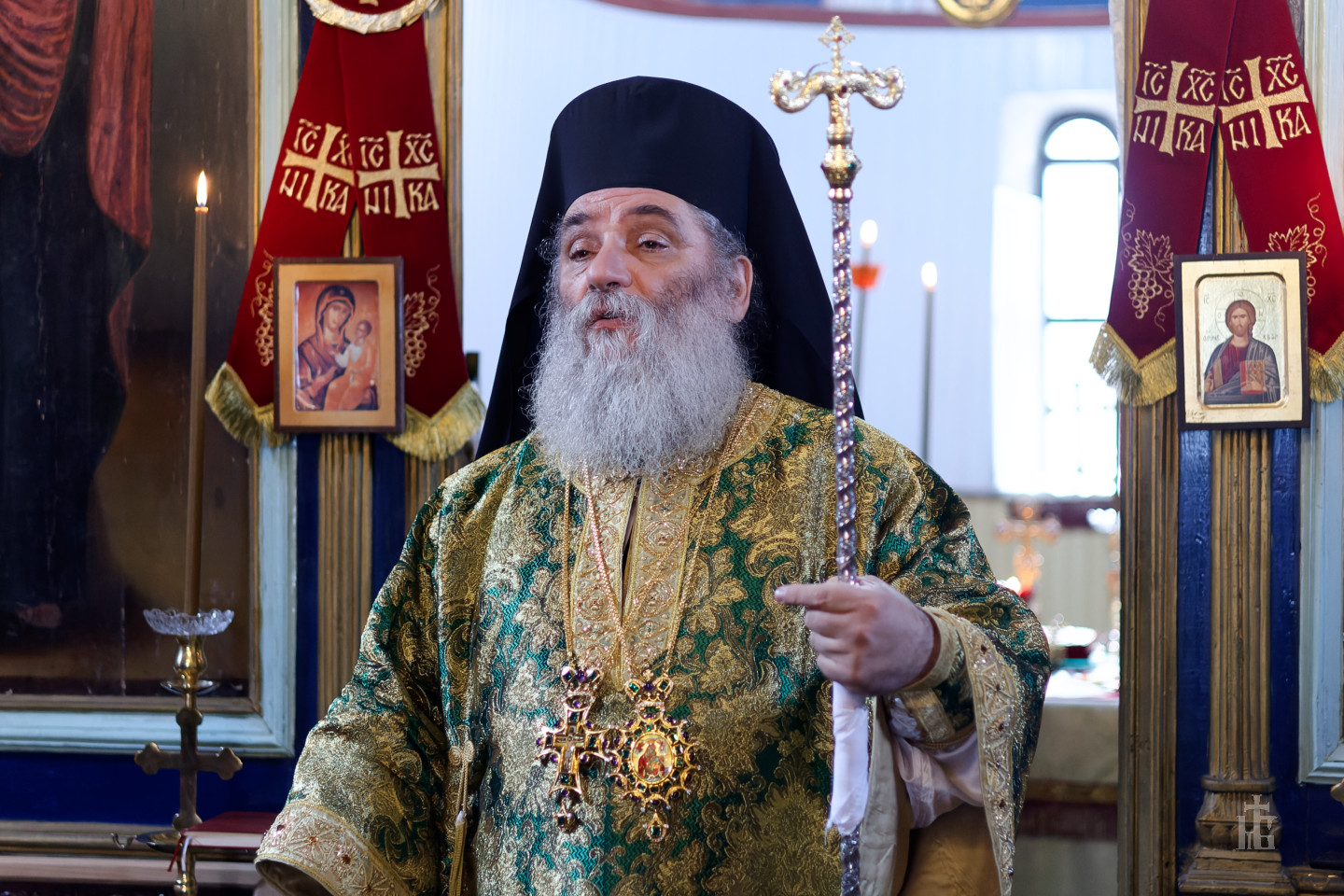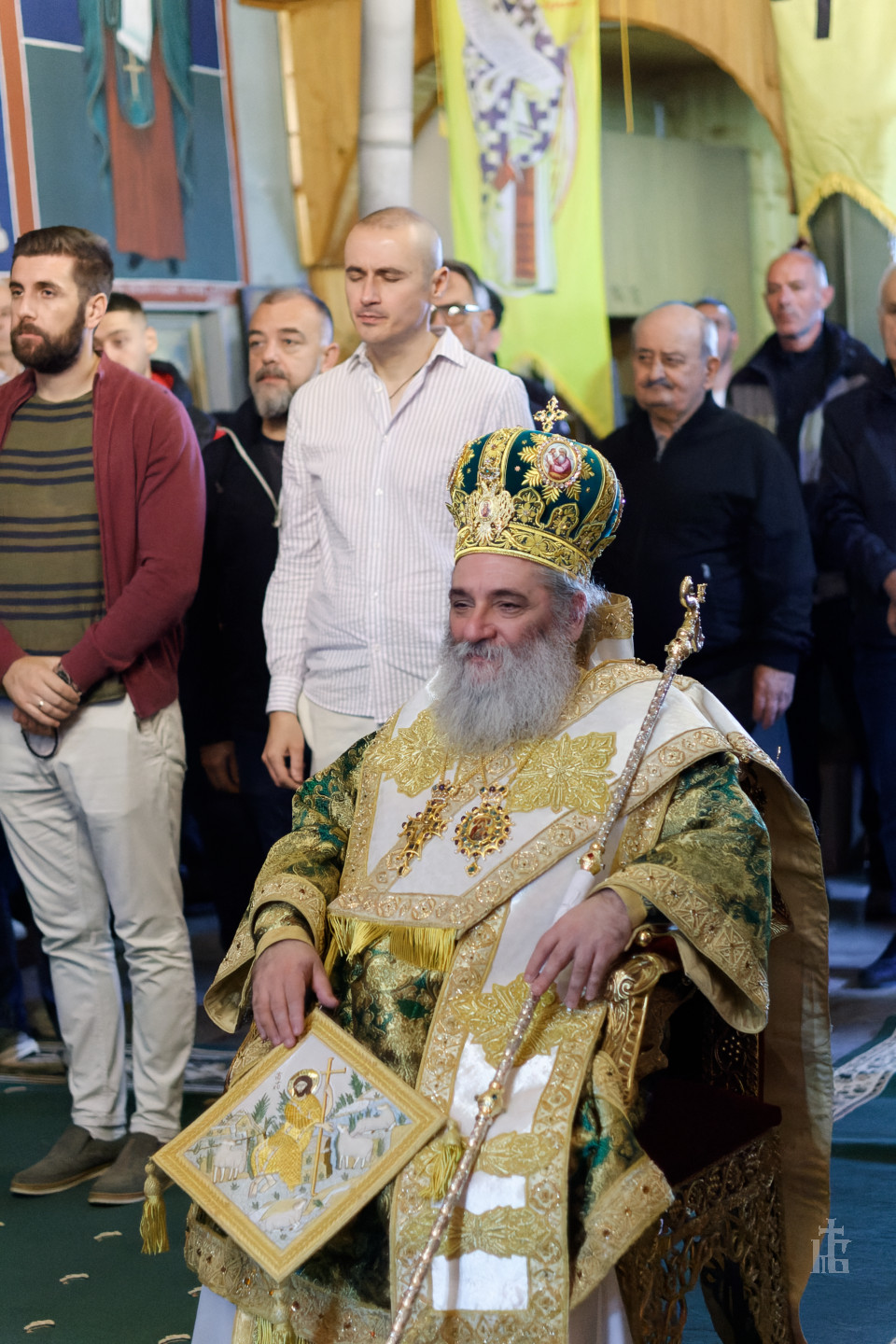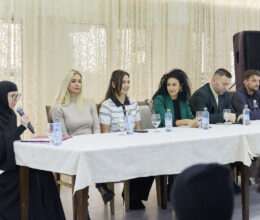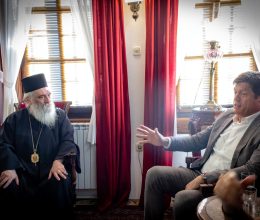A Homily by His Grace Bishop Parthenius of Antania, delivered on the feast day of Saint Parascheva of Epivatos, during the Divine Liturgy at the church of the Venerable Parascheva in the city of Debar, on October 14/27, 2023 A.D.
In the name of the Father, and of the Son, and of the Holy Spirit!
Beloved, man is called to holiness by God Himself. In fact, he is created to be holy. This is clearly stated by the Lord Jesus Christ in the Gospel when He calls His disciples: “Be perfect, just as your Father in heaven is perfect” (Matthew 5:48). Thus, the goal of man is to become divinized, to attain holiness, to become godlike. The foundation for deification was given to us through Holy Baptism. During the very act of this great and fundamental sacrament of the Church, the words of the Apostle Paul—heard moments ago in today’s Epistle reading—are always chanted: “As many of you as were baptized into Christ have put on Christ” (Galatians 3:27). And since Christ is the only One who is holy by nature, it follows that everyone baptized into Him is called to holiness. For every person who emerges from the baptismal font, we say that they come forth cleansed of sin: an infant, from the inherited consequences of the Fall, and adults, from the transgressions committed up to that point. Thus, every newly baptized person is holy. In other words, through Baptism, we receive such Divine grace that we are empowered to strive toward attaining the likeness of God. We are given the potential to become holy, to become citizens of the Kingdom of God, children of the very Triune God.

Our venerable mother Parascheva, whose memory we celebrate today, worthily made use of the Divine grace she received through Holy Baptism and fully realized her potential for holiness. Through ascetic struggle, self-restraint, and unceasing prayer, Saint Parascheva attained the heights of deification. She fulfilled, in practice, the calling that every person is given—to become holy. Like all the saints of the Church, she loved Christ fervently, and through that love for Him, she transcended all distinctions of this world: national and social identity, material status, levels of external education, and even the very limitations of physical nature. This is precisely what the Apostle Paul speaks of in today’s Epistle reading, immediately following the proclamation of being clothed in Christ: “There is neither Jew nor Greek; there is neither slave nor free; there is neither male nor female; for you are all one in Christ Jesus” (Galatians 3:28). In other words, those who have been divinized transcend all divisions and categories of this age, becoming universal through the grace of Christ.
Indeed, we see that Saint Parascheva is celebrated by many different nations across the Earth—she is honored throughout the world. Holiness is what truly unites people in a lasting and meaningful way.
Да се биде свет значи да се биде човек на целиот свет, односно човек над светот – човек кој со крстовоскресна љубов го прегрнува светот. Сведоштво за тоа ни е Самиот Христос. Историски гледано, досега никој толку силно не го обединил светот како Христа, во Кого се надминуваат сите различности и предрасуди. Една таква цивилизациска обединетост наоѓаме во големата и долготрајна Ромејска Империја, во којашто сите народности живееле обединети во духот на Христијанството. Во последниов век обид за интегрирање на народите гледаме и во Европа, каде што како оски за обединување повторно среќаваме дел од општите човечки вредности кои се цивилизациска придобивка на Христијанството, како, на пример: слободата, еднаквоста на народите и на јазиците, образованието, солидарноста – нешта што биле проткаени во културата на христијанско живеење во ромејскиот свет.
To be holy means to be a person for the whole world—indeed, a person above the world—one who embraces the world with the love of the Cross and the Resurrection. Christ Himself is the ultimate testimony to this. From a historical perspective, no one has ever united the world as Christ has, in whom all differences and prejudices are overcome. A striking example of such civilizational unity is found in the great and long-lasting Byzantine (Roman) Empire, where people of all ethnicities lived united in the spirit of Christianity. In modern times, we see an attempt to integrate nations in Europe, where certain common human values—such as freedom, equality of peoples and languages, education, and solidarity—serve as unifying principles. These values, in fact, are a legacy of Christianity, deeply woven into the culture of Christian life in the Byzantine world.

Beloved, within his very nature, man carries a deep longing for union with others; he has a natural need to commune, to connect, to share. Throughout human history, there have been numerous efforts toward unity. If we look at the Holy Scriptures, we see that people, though sinful and estranged from God, naturally sought togetherness. Thus, in the Old Testament, there is an account from a time when all people spoke a common language. They united to build a great tower, hoping that, should another catastrophe like the Flood occur, they could climb it and be saved. Fearing the destruction of the old world by the Flood, they began constructing the Tower of Babel as a refuge from the waters. However, since they built the tower in sin, pride, and defiance of God, the Lord did not bless this unity but instead confused their languages, preventing them from understanding one another and completing the tower.
Authentic unity among people can only occur in spirit and truth. The Holy Spirit unites all. On the day of Pentecost, when Christ sent the Holy Spirit upon the Apostles, those uneducated fishermen, though they had never studied foreign languages, suddenly became so enlightened that they began speaking in various tongues. They addressed every person in Jerusalem, who had come from many nations for the feast, in their native languages. In this way, the entire world at that time was united in the Church of Christ. Even today, the Church must serve as a pioneer of true spiritual unity among nations, not as an instrument for creating or deepening divisions based on nationality, politics, social status, or any other affiliation. For us Christians, the only thing that should matter is that we belong to Christ; everything else is secondary. We have been granted the priceless privilege of being united in the right and essential way—through prayer and, above all, through the most pure Body and life-giving Blood of our Lord Jesus Christ, becoming true brothers and sisters in Him. The blessed Elder Emilianos of Simonopetra once said: “Prayer is the simplest, most direct way always available to us, through which we become participants and partakers in the nature of the Lord Jesus Christ, while each of us, so simply and beautifully, lives out our personal life. We are all different characters, different types, different stories, but through the same prayer, we all become Jesus Christ.”
Thus, beloved, holiness is the primary and true factor for the unity of people. It is the original “globalization,” not the current one, which—though it may preach equality, fairness, unity, and solidarity, values that are indeed fruits of the Christian faith—does not know holiness. Today’s globalization promotes the pursuit of success and recognition, material wealth, education and careers, personal distinction, and comfort, but it lacks the experience of true holiness. It does not realize that only a holy person is a complete, fulfilled, and joyful person. Holiness has been given to us as a command from God Himself, for without it, and without striving for it, we will not enter the New World, the new Heaven and new Earth that the Lord will create. This is the essence of the words of Paul, directed to Christians: “Pursue peace with all people, and holiness, without which no one will see the Lord” (Hebrews 12:14).
Therefore, we must strive to imitate the examples of God’s Saints, like today’s celebrated saint, the Venerable Parascheva. Though she was but a weak woman, she labored so diligently and persistently in the pursuit of holiness that she surpassed many men in spiritual strength and became a true hero of our faith. Of course, her goal was not earthly glory or to be honored by many, but she sought only the acquisition of Divine grace. She lived a very humble monastic life, devoted to fasting, prayer, and contemplation of God. Yet the merciful God glorified her so greatly that, after her repose, He granted her incorruptibility of the body, which has remained intact and unspoiled for a thousand years. As you all know, her holy relics rest in the city of Iași, Romania, where countless pilgrims venerate them. This year alone, as Bishop Damaschin of Romania told us, around 350,000 people came to venerate Saint Parascheva on her feast day! There is simply no nation that does not honor her. Because of her obedience to the Church, her ascetic labors for God, and her humility, God granted her freedom in His Kingdom and glorified her here on Earth. He revealed her holiness to people to show that holiness is not only possible but accessible and truly attainable—that anyone who desires it can become holy.
Saint Parascheva was a human being, just like all of us. She had the same frail body as we do, experienced the same emotions, pains, joys, and weaknesses as any other ordinary person. Yet, with great zeal, she strove to lift her mind and entire being toward Heaven. After many years of ascetic struggle, bearing her voluntary cross for Christ, she became one with Him and all the Saints.

Beloved, we see that only holiness unites humanity across time and space. Sin cannot unite the world because its very nature is alienation. Even today, we observe how the world strives for unity, yet struggles greatly to achieve it. The global order not only fails to strive for holiness, but instead undermines the moral and ethical principles that are inherent to holiness and that form the foundation of our civilization, especially the European one. In the past, the primary ideals and role models for our ancestors were God’s Saints, along with their divinely inspired lives and struggles. Many of them may not have been as educated or literate as today’s generations, but they all lived according to a Christian philosophy of life. They were born and died with the Gospel. And we, too, witnessed those times. The elders knew how to teach us that, above all, a person must strive to live a holy and upright life, to aspire to holiness. But today, unfortunately, even the last traces of that common Christian philosophy seem to be fading. Attending church, and even our Christianity itself, has become somewhat formal—merely a habit or motivated by personal and psychological reasons, rather than a sincere desire to imitate Christ and strive for holiness. As the blessed Father Alexander Schmemann once wrote, there is a danger of having a church and Christianity without Christ.
Thus, beloved, we need true spiritual effort, a sincere desire, and labor to attain holiness, which is acquired through both practical and contemplative Christian living—a life filled with good deeds, prayer, and meditation on God. Holiness is attained when we patiently and diligently strive for the fruits of the Holy Spirit: “love, joy, peace, longsuffering, kindness, goodness, faithfulness, gentleness, self-control” (Galatians 5:22-23), and of course, when we labor in prayer, which must be practiced unceasingly. This world desperately needs prayer, and only through it can we be united in harmony, love, and peace. We all see how much our world needs love and peace, as it is shaken by the unrest between people and nations. Although everyone declares a desire for peace, we hear the clashing of weapons everywhere, and people cry out in anguish over the loss of their loved ones. For this reason, perhaps more than ever, we need prayer. We have strong motivation for it, as well as many examples of saints who attained holiness through prayer. Our Church is adorned with the heavenly glory of many deified individuals who walked our path and reached holiness. Holiness remains alive and active to this day. It is enough to recall the great Elders of our time, whom the Church has recognized as saints and included in its calendar, following their glorification in the Lord.
Therefore, let us embrace the Holy Gospel and embody it in our lives. Let us hasten toward holiness, striving to become like our Father in Heaven. May the prayers of our venerable mother Parascheva, who endured much for Christ and became a resident of the Heavenly Kingdom, assist us on this path. She intercedes for us before the Lord, so that, strengthened by His power, we may live according to the Christian ideal of holiness, nurturing and multiplying the Divine grace given to us at Holy Baptism. Amen!















